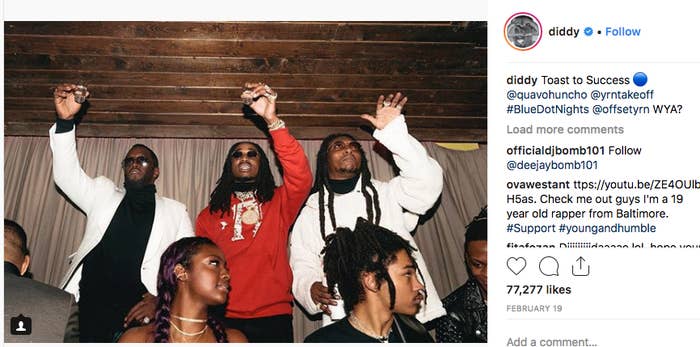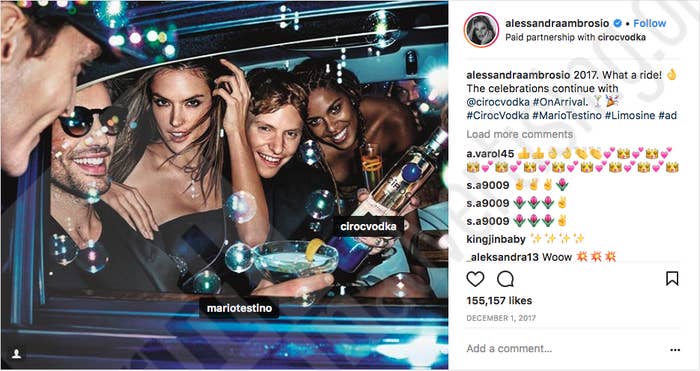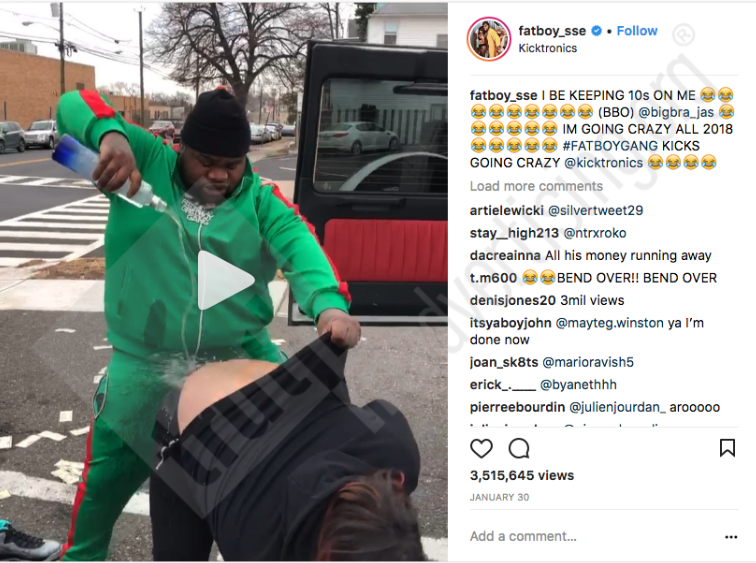
Sean "Diddy" Combs and other online influencers could soon be in hot water with the Federal Trade Commission over influencer marketing on Instagram for Cîroc vodka. An advocacy group called Truth In Advertising (TINA) has sent a complaint letter to the FTC, which sets guidelines on how ads on social media must be disclosed, asking it to look into Cîroc’s #sponsored posts — including many from Diddy himself.
TINA collected 1,700 Instagram posts about Cîroc from 50 influencers that weren’t up to FTC snuff, the group said. The influencers ranged from stars like Diddy (who is a Cîroc marketing partner with the liquor maker Diageo and promotes the vodka on his personal social media, well, constantly), French Montana, Alessandra Ambrosio, Cassie, Bow Wow, and Ashanti to smaller Instagram personalities like Evelyn Gonzalez and Frank Gallucci.
TINA has a full list. We’ve reached out to a number of the influencers named in the report.
The FTC’s guidelines say that if you have a “material relationship” to a product that you’re posting about on your Instagram — say, you own 50% of the company, or you’re being paid $10,000 to post, or even if you just got a big free gift — you have to disclose it in the captions using words like “ad” or “sponsored.” And the FTC doesn’t want influencers sneaking away with confusing language like #sp or #[brand]partner, or sticking their #ad disclosure at the end of a long caption.
Some of the Cîroc posts attempt disclosure, but not enough to meet the FTC’s standards. For example, model Alessandra Ambrosio posted with the “Paid partnership with” feature at the top of her post. But the FTC has said in past cases that using this feature is not sufficient. Actor Mikaela Hoover posted with the hashtag #CirocPartner, but that hashtag is ambiguous and comes at the end of the post, after it would be cut off on the feed.
“We have a rigorous marketing code and take our role as a responsible marketer very seriously and have a strong commitment to comply with the FTC’s standards on advertising,” a spokesperson for Diageo told BuzzFeed News. “We are investigating this as a matter of urgency.” Combs Enterprises, Diddy’s company, did not respond to a request for comment.

This is not the first time Diddy or Cîroc have brushed up against the FTC. In 2017, the FTC sent Diddy a letter along with about 45 other celebrities gently reminding them about the ad disclosure rules. In March 2018, DJ Khaled, a spokesperson for Cîroc, received a letter along with Diageo from TINA about his undisclosed ads for the brand (he cleaned up his social media afterward by adding #ad to old posts).
It’s unclear what the FTC will do with the letter from TINA (it did not have any comment on the letter at this time). Historically, the FTC has only ever taken enforcement action a handful of times over undisclosed social media endorsements, and always against the brand or marketers, not the individual influencers or bloggers. In 2016, the FTC brought charges against Lord & Taylor over fashion blogger ads and against Warner Bros. for paying video game influencers, including top YouTuber PewDiePie, to give its latest game a good review.
The trickier part of TINA’s complaint is the accusation that social media ads — including those for alcohol — often reach an under-21 demographic. This doesn’t violate any laws as alcohol advertising is self-regulated by the industry, but it runs afoul of good practices. And even then, David Jernigan, a professor of public health at Boston University who focuses on alcohol policy, says, “There are no penalties if you violate the [industry] rules.”
TINA wrote in its announcement, “While teens aged 13–17 make up only 7% of Instagram users worldwide, the 18–24 demographic (the largest) comprises 31% of users.” A representative for the Distilled Spirits Council, the industry regulating body, did not reply to a request for comment.
TINA puts the Cîroc violations in the context of a broader issue with influencer marketing: Brands are not totally in control of the creative output of the influencers. The group cited examples of ads that appear to promote binge drinking. (Diageo, like many other alcohol companies, says it endorses responsible drinking.) In one ad, comedian and rapper Fatboy SSE throws money and shoes on a woman, then pours vodka on her back — which is probably not how Cîroc wants to be an #ad.

